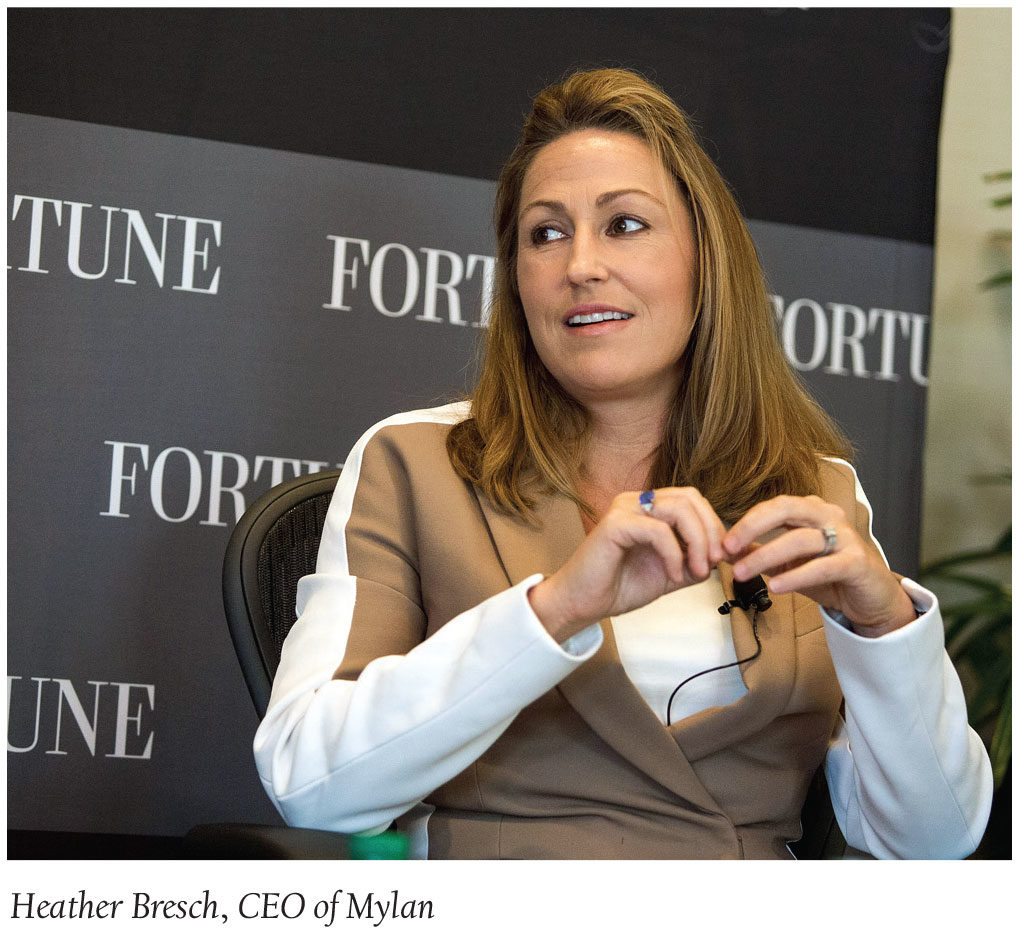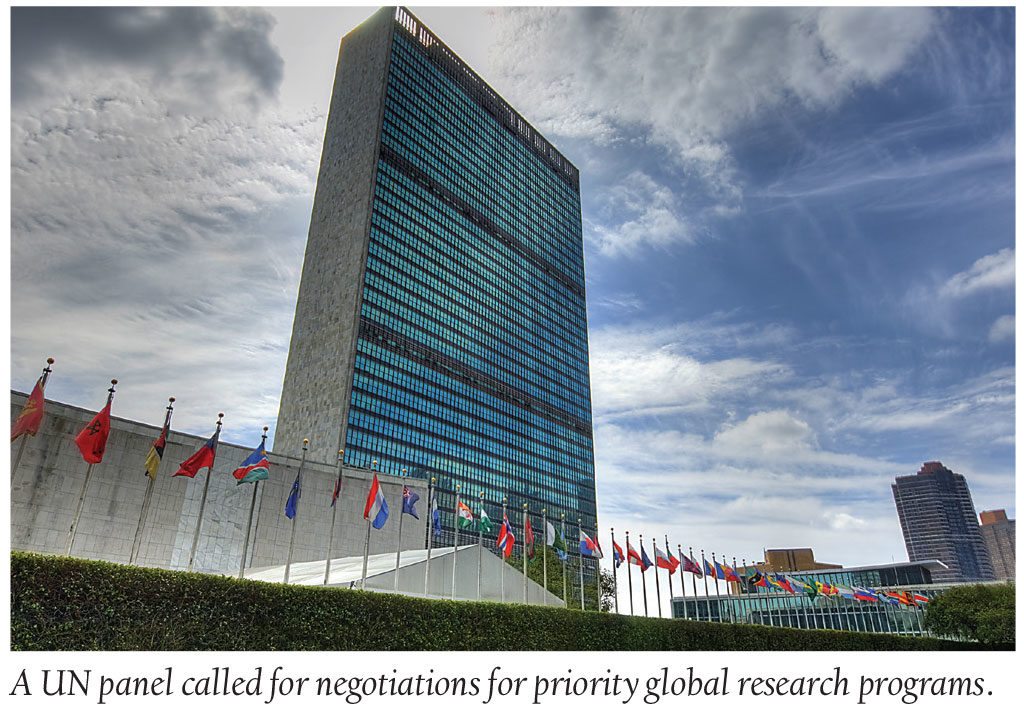Controversy Surrounding Mylan’s EpiPen
 Heather Bresch, CEO of Mylan, testified before the U.S. House Committee in late September to address the price hike of the EpiPen. Criticism from the public and lawmakers surrounding Mylan epinephrine injectors reached an all-time high in August. Since acquiring the EpiPen in 2007, Mylan raised the price of a two-pack more than 500% to $608. “There is justified outrage from families and schools across the country struggling to afford the high cost of EpiPens,” said committee Chairman Jason Chaffetz (R-UT).
Heather Bresch, CEO of Mylan, testified before the U.S. House Committee in late September to address the price hike of the EpiPen. Criticism from the public and lawmakers surrounding Mylan epinephrine injectors reached an all-time high in August. Since acquiring the EpiPen in 2007, Mylan raised the price of a two-pack more than 500% to $608. “There is justified outrage from families and schools across the country struggling to afford the high cost of EpiPens,” said committee Chairman Jason Chaffetz (R-UT).
Bresch defended the rising cost of EpiPens, and explained that the company pays a majority of the list price in the form of rebates and fees. “I think many people incorrectly assume we make $600 off each EpiPen. This is simply not true,” Bresch said in a statement to the Wall Street Journal. Mylan pays back $274 of the list price in rebates and fees to health insurers and drug-benefit managers, Bresch said. Members of the committee, however, were not convinced with Bresch’s defense. “In Mylan’s case, they had a virtual monopoly over the market, and they took advantage of it,” said Rep. Elijah Cummings (D-MD), at the committee meeting. The company will launch a generic version of the EpiPen, which will cost half the price of the brand-name product, Bresch noted.
IPG Mediabrands Creates Healix
The global media arm of Interpublic Group launched Healix, a new global division that will service the majority of IPG Mediabrands’ healthcare clients. “Healix is an evolution of our best-in-class services,” said Henry Tajer, global CEO of IPG Mediabrands. “The dynamic talent working at Healix is committed to creating better business outcomes for healthcare brands, backed by our network’s expertise across media intelligence and innovation.” Jeffrey D. Erb, who will serve as President, North America, leads Healix. Healix represents numerous clientele who are at the forefront for reshaping the future of life sciences. Healix is headquartered in New York, NY, with offices in Princeton, NJ and affiliates in EMEA and APAC regions.
Taro Subpoenaed Over Generic Drug Pricing
Taro Pharmaceuticals has been issued a grand jury subpoena by the SEC requesting information about its generic drug pricing and sales. The company must present evidence of corporate and employee records, generic pharmaceutical products and pricing, and communications with competitors and others. CEO Kalyanasundaram Subramanian said in a statement, “Taro intends to respond to the subpoena and otherwise cooperate with the Department of Justice investigation.”
BioArctic to Collaborate with AbbVie for Parkinson’s Disease
Swedish startup BioArctic has partnered with AbbVie to develop and commercialize BioArctic’s antibody portfolio against the protein alpha-synuclein to treat Parkinson’s disease and other potential indications. Mutations in alpha-synuclein are strongly linked to the development of Parkinson’s disease, which affects more than 10 million people worldwide. “AbbVie has shown a strong commitment to Parkinson’s disease and I am proud that they have chosen to collaborate with BioArctic,” said BioArctic CEO Gunilla Osswald in a statement. Founded in 2003, BioArctic aims to develop immunotherapies for neurodegenerative diseases.
The UN vs. Drug R&D
 UN Secretary-General Ban Ki-moon created a UN panel last year to address “policy incoherence” between the rights of inventors, international human rights law, trade rules, and public health needs. The panel has returned this year with a report that urges the UN to negotiate global agreements for priority research programs, primarily calling for “a binding R&D Convention that delinks the costs of R&D from end prices.” Panelist Andrew Witty, CEO at GlaxoSmithKline, has already expressed doubts about actually pulling together such a convention due to the government funds it would require.
UN Secretary-General Ban Ki-moon created a UN panel last year to address “policy incoherence” between the rights of inventors, international human rights law, trade rules, and public health needs. The panel has returned this year with a report that urges the UN to negotiate global agreements for priority research programs, primarily calling for “a binding R&D Convention that delinks the costs of R&D from end prices.” Panelist Andrew Witty, CEO at GlaxoSmithKline, has already expressed doubts about actually pulling together such a convention due to the government funds it would require.
The panel also recommends greater transparency on drug development costs, assuming anywhere between $150 million to $4 billion, as well as an end to “implicit threats” sometimes put forth by Western governments and companies to stop developing countries from legally overriding drug patents. The UN concludes that the world cannot rely solely on free markets to deliver medicines needed by billions of people in poor countries and governments should legally bind to coordinate and fund research to make up for areas where the system fails, like the recent hunt for new antibiotics against “superbug” resistant bacteria or tropical diseases.
UnitedHealth Group Shifts Coverage Plan to Focus on Biosimilars
UnitedHealth Group, the largest U.S. health insurer, is joining the ranks of insurers opting to prioritize lower-priced versions of drugs over their brand-name counterparts. In a bulletin seeking client feedback, UnitedHealth announced it is changing its reimbursement terms for long-acting insulins and will no longer cover Lantus, a primary insulin drug marketed by Sanofi, according to Reuters. Instead UnitedHealth will cover Eli Lilly’s biosimilar insulin Basaglar as “Tier 1,” the lowest out-of-pocket costs for members. Novo Nordisk’s Levemir will move from Tier 1 to Tier 2. “We are disappointed with the decision,” a spokesperson for Sanofi told Reuters. “For Sanofi, it is a pity not to leave doctors a choice. We had anticipated this kind of decision but we are holding discussions with other organizations in the U.S. to have them keep Lantus on their lists.”
UnitedHealth is also excluding Amgen’s white blood cell-boosting drug Neupogen, in favor of Zarxio, a biosimilar sold by Novartis. Although biosimilars can’t be exactly replicated like protein-based biotech drugs, they have equivalent efficacy.
Sanofi Files Patent Infringement Suit Against Merck
Sanofi is taking Merck to court alleging that the company infringed 10 patents covering its insulin glargine products Lantus and Lantus SoloSTAR. The French drug maker noted that the case was initiated because Merck filed a New Drug Application in early August for its biosimilar insulin glargine drug product MK-1293. Merck’s application included a Paragraph IV Certification challenging all 10 of Sanofi’s patents listed in the FDA Orange Book for Lantus and the SoloSTAR products, according to Sanofi. The drug manufacturer had filed an infringement suit against Eli Lilly in 2014 regarding Lantus, but then settled the case with a deal that Lilly delay the launch of its Lantus biosimilar to December 2016.
Zika Virus Testing Restrictions
The Zika virus has reached Florida, and it’s anticipated to soon migrate to Texas, Louisiana, and other southern states. Currently, pregnant women with possible exposure to Zika and people with symptoms of the virus are given priority testing. Although the virus can be detected in semen up to six months following infection, both the WHO and CDC are not recommending testing for men. Restrictions are to prevent an onslaught of requests for Zika tests.
The FDA issued an Emergency Use Authorization (EUA) for Roche’s Zika test, the LightMix Zika rRT-PCR Test. “[It’s] an easy-to-use molecular diagnostic test that enables healthcare professionals to quickly detect the virus,” said Uwe Oberlaender, Head of Roche Molecular Diagnostics. The test will be used in patients who meet the CDC and Prevention Zika virus clinical criteria.




